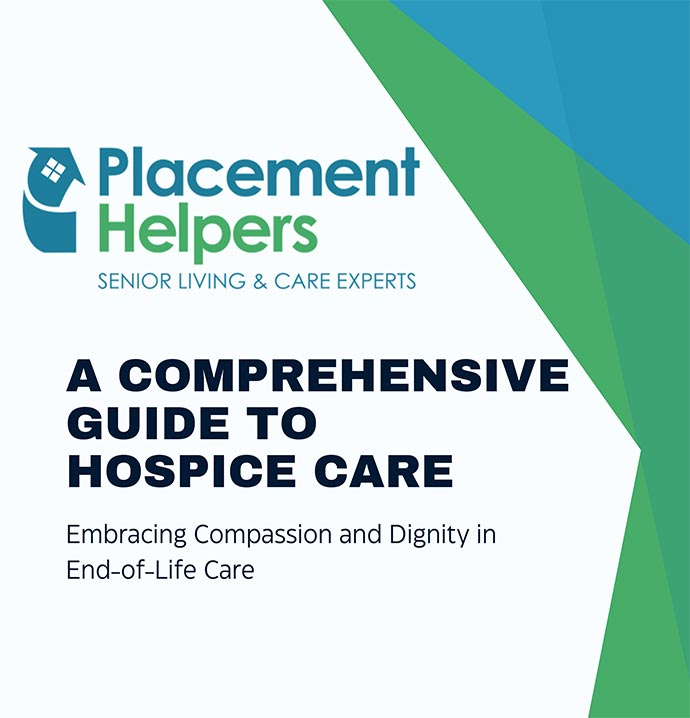A Comprehensive Guide to Hospice Care
Embracing Compassion and Dignity in End-of-Life Care
What Is Hospice Care?
Hospice care is a specialized type of care focused on providing support, comfort, and quality of life to individuals who are in the final stages of a terminal illness. Hospice care aims to alleviate pain and manage symptoms while addressing the emotional, spiritual, and social needs of both the patient and their loved ones.

Here are key aspects of hospice care:
- Focus on Comfort: The primary goal of hospice care is to ensure the highest possible quality of life for individuals facing a life-limiting illness. Comfort measures, including pain management, are prioritized to relieve physical discomfort and enhance overall well-being.
- Multidisciplinary Team: Hospice care involves a multidisciplinary team of professionals who work together to provide comprehensive care. This team may include doctors, nurses, social workers, counselors, spiritual care providers, and trained volunteers. They collaborate to address the diverse needs of patients and their families.
- Personalized Care Plans: Hospice care plans are tailored to the individual's unique needs, preferences, and goals. Care plans encompass medical treatments, pain and symptom management, emotional and psychological support, and spiritual care. These plans are regularly reviewed and adjusted as needed.
- Support for Family and Caregivers: Hospice care recognizes the importance of supporting family members and caregivers who are involved in the patient's care. They receive emotional support, education, and guidance to navigate the challenges associated with end-of-life care.
- In-Home or Facility-Based Care: Hospice care can be provided in various settings, including the individual's home, nursing homes, assisted living facilities, residential care homes, or dedicated hospice centers. The goal is to ensure that patients receive care in a comfortable and familiar environment.
- Bereavement Support: Hospice care includes bereavement support for the family and loved ones after the patient's passing. This may involve counseling, support groups, or other resources to help individuals navigate the grieving process.
It's important to note that hospice care is typically provided when curative treatments are no longer effective or desired. The focus shifts from seeking a cure to enhancing comfort and maintaining dignity during the end-of-life journey.
Access to hospice care is usually based on a prognosis indicating a life expectancy of six months or less. However, individual eligibility may vary depending on specific guidelines and regulations established by hospice organizations and insurance providers.
Hospice care is designed to provide compassionate support during the final stages of life, ensuring that patients receive the necessary physical, emotional, and spiritual care while respecting their wishes and values.
What Kind of Personnel Can You Expect From a Hospice Agency?
Hospice agencies employ a variety of personnel who work together as a multidisciplinary team to provide comprehensive care and support to patients and their families. The specific personnel you can expect from a hospice agency may vary slightly depending on the agency and the specific needs of the patient, but here are some common roles you may encounter:

- Medical Director: The medical director is typically a physician who oversees the medical aspects of hospice care. They collaborate with the patient's primary care physician and the interdisciplinary team to develop and oversee the patient's care plan, provide medical guidance, and ensure appropriate pain and symptom management.
- Registered Nurses (RNs): Registered nurses play a central role in hospice care. They assess the patient's physical condition, manage pain and symptoms, administer medications, and provide skilled nursing care. RNs also educate patients and their families about the care process and offer emotional support.
- Certified Nursing Assistants (CNAs): Certified nursing assistants assist with personal care, such as bathing, dressing, grooming, and toileting. They provide hands-on support to help patients with activities of daily living (ADLs) and offer comfort and companionship.
- Social Workers: Hospice social workers focus on the emotional, social, and practical needs of patients and their families. They provide counseling, guidance, and assistance with accessing community resources. Social workers also help patients and families navigate end-of-life planning, advance directives, and bereavement support.
- Chaplains/Spiritual Care Providers: Hospice chaplains or spiritual care providers offer spiritual and emotional support to patients and their families, respecting their individual beliefs and values. They provide religious or spiritual guidance, conduct rituals or prayers, and address existential concerns during the end-of-life journey.
- Bereavement Counselors: Hospice agencies often have bereavement counselors who provide counseling and support to family members and loved ones after the patient's passing. They offer assistance in navigating the grief and mourning process and provide resources for coping and healing.
- Volunteers: Hospice volunteers are an integral part of the care team. They may provide companionship, respite care, run errands, assist with household tasks, or offer emotional support to patients and families. Volunteers undergo training and work under the supervision of the hospice agency.
It's important to note that the specific composition of personnel can vary between hospice agencies, and not all agencies may have every role listed above. The interdisciplinary team collaborates to provide holistic care, addressing the physical, emotional, social, and spiritual needs of patients and their families throughout the end-of-life journey.
What Services Are Included With Hospice Care?
Hospice care provides a comprehensive range of services to address the physical, emotional, social, and spiritual needs of patients and their families during the end-of-life journey. The specific services included in hospice care can vary depending on the individual's needs, the hospice agency, and local regulations, but here are some common services:

- Medical Care: Hospice provides medical care focused on pain and symptom management to enhance the patient's comfort and quality of life. This includes medications, treatments, and therapies to alleviate physical distress and promote overall well-being.
- Nursing Care: Skilled nursing care is an essential component of hospice. Registered nurses (RNs) assess and monitor the patient's condition, manage pain and symptoms, provide wound care, administer medications, and offer guidance on managing health issues.
- Personal Care: Hospice aides or certified nursing assistants (CNAs) assist with personal care tasks such as bathing, grooming, dressing, and toileting. They provide hands-on support to help patients with activities of daily living (ADLs) and maintain personal hygiene.
- Emotional and Psychosocial Support: Hospice care includes emotional and psychosocial support for patients and their families. Social workers, counselors, or therapists provide counseling, emotional support, and assistance in coping with the emotional challenges associated with end-of-life care.
- Spiritual Care: Hospice recognizes the importance of spiritual and existential concerns during the end-of-life journey. Chaplains or spiritual care providers offer support, religious or spiritual guidance, and help patients and families navigate their unique beliefs and values.
- Bereavement Support: Hospice provides bereavement support for family members and loved ones following the patient's passing. Bereavement counselors or support groups offer counseling, resources, and guidance to help individuals cope with grief and loss.
- Medications and Medical Equipment: Hospice covers medications related to the patient's terminal illness, pain management, and symptom control. Additionally, necessary medical equipment and supplies such as wheelchairs, oxygen, and wound dressings are typically provided.
- Volunteer Support: Hospice agencies often have trained volunteers who offer companionship, respite care, or assistance with practical tasks. Volunteers provide emotional support, run errands, offer transportation, or engage in activities to enhance the patient's well-being.
- Caregiver Education and Support: Hospice offers education and training to family caregivers, helping them navigate the challenges of caring for a loved one during the end-of-life period. This may include guidance on caregiving techniques, assistance with decision-making, and emotional support for caregivers.
- Care Coordination: Hospice provides coordination of care among various team members, ensuring that all aspects of care align with the patient's goals and preferences. This includes collaborating with healthcare professionals, arranging necessary services, and communicating with the patient and family.
It's important to note that the specific services provided may vary depending on the hospice agency and individualized care plans. Hospice care aims to meet the unique needs and preferences of each patient and family, ensuring that they receive comprehensive support during the end-of-life journey.
How to Pay for Hospice Care Services?
Hospice care services can be paid for through a variety of methods, depending on the individual's insurance coverage, financial resources, and available assistance programs. Here are some common ways to pay for hospice care services:

- Medicare: Medicare is a federal health insurance program available for individuals aged 65 and older or those with certain disabilities. Hospice care is covered under Medicare Part A, and eligible individuals can receive hospice services with little to no cost-sharing. This includes coverage for medical services, medications, equipment, and support services related to the terminal illness.
- Medicaid: Medicaid is a joint federal and state program that provides healthcare coverage for individuals with limited income and resources. Hospice care is a mandatory benefit under Medicaid, and coverage varies by state. Eligibility requirements and covered services may differ, so it's important to check with the local Medicaid office for specific details.
- Private Health Insurance: Many private health insurance plans offer coverage for hospice care. Coverage varies depending on the specific policy, so it's essential to review the policy documents or contact the insurance provider directly to understand the extent of coverage, any cost-sharing requirements, and any limitations or restrictions.
- Veterans Benefits: Veterans or their surviving spouses may be eligible for certain hospice benefits through the U.S. Department of Veterans Affairs (VA). The VA offers various programs that can provide financial assistance for hospice care, including the Veterans Affairs (VA) Hospice Care program and the Aid and Attendance Pension program.
- Long-Term Care Insurance: Some individuals may have long-term care insurance policies that include coverage for hospice care services. Review the policy details to understand the coverage, limitations, and requirements for reimbursement. Not all long-term care insurance policies cover hospice care, so it's important to check with the specific insurance provider.
- Private Funds: Personal savings, retirement funds, or other private financial resources can be used to pay for hospice care services. It's advisable to plan and save for end-of-life care expenses in advance to ensure sufficient funds are available when needed.
- Charitable Organizations and Assistance Programs: There are charitable organizations and assistance programs that may provide financial aid or grants to help individuals with limited resources cover the costs of hospice care. These organizations may have specific eligibility criteria and application processes, so research local resources or consult with social workers or hospice agencies for potential assistance options.
It's important to note that coverage and payment options for hospice care can vary based on individual circumstances, insurance plans, and location. It's advisable to consult with hospice agencies, insurance providers, and financial advisors to explore the most suitable options for paying for hospice care services based on your specific situation.
What Types of Supplies and Equipment Are Offered With Hospice Care?
Hospice care often includes the provision of necessary supplies and equipment to support the comfort and care of patients in their homes or care facilities. The specific supplies and equipment provided can vary depending on the individual's needs, the hospice agency, and local regulations. Here are some common examples:

Medical Equipment:
- Hospital beds or adjustable beds for comfort and positioning.
- Wheelchairs or mobility aids to assist with movement and mobility.
- Oxygen therapy equipment to support respiratory needs.
- Patient lifts or transfer devices to aid with safe transfers and mobility.
- Nebulizers or inhalers for respiratory treatments.
Personal Care Supplies:
- Incontinence supplies such as adult diapers, pads, or bed pads.
- Wound care supplies such as dressings, ointments, or bandages.
- Personal hygiene items, including washcloths, wipes, or disposable gloves.
- Mobility aids like walkers, canes, or grab bars for bathroom safety.
Medications:
- Medications prescribed by the hospice team to manage symptoms, pain, and provide comfort.
- Prescription medications for the patient's underlying medical conditions, if applicable.
Medical Supplies:
- Catheters or ostomy supplies for individuals with specific medical needs.
- Enteral nutrition supplies for individuals requiring tube feeding.
- Syringes, needles, or insulin supplies for individuals with diabetes.
Comfort and Supportive Supplies:
- Bed linens, pillows, and blankets for comfort.
- Positioning aids or cushions to help relieve pressure sores or discomfort.
- Over-the-counter medications for symptom management (e.g., pain relievers, antacids).
It's important to note that the specific supplies and equipment provided can vary depending on the individual's needs and the care plan developed by the hospice team. The hospice agency's healthcare professionals, such as nurses or therapists, will assess the patient's requirements and ensure that the necessary supplies and equipment are available.
Hospice agencies typically work closely with medical suppliers or durable medical equipment providers to coordinate the delivery, maintenance, and replacement of necessary supplies and equipment. They will also provide education and guidance on how to properly use and manage the equipment and supplies to ensure patient safety and comfort.
Individuals and their families should communicate with the hospice agency to discuss the specific supplies and equipment needed for their situation and seek guidance on obtaining and maintaining them throughout the hospice care period.
Who Is a Good Candidate for Hospice?
A good candidate for hospice care is an individual with a life-limiting illness or condition for which curative treatments are no longer effective or desired. Hospice care is typically recommended when the prognosis indicates a life expectancy of six months or less, although individual eligibility may vary based on specific guidelines and regulations.

Here are some factors that may indicate someone is a suitable candidate for hospice care:
- Declining Health: The individual's health has significantly declined, and curative treatments are no longer providing significant benefit or are causing more harm than good. This may include conditions such as advanced cancer, end-stage heart failure, chronic obstructive pulmonary disease (COPD), or neurodegenerative diseases.
- Palliative Needs: The individual requires palliative care to manage pain, symptoms, and discomfort associated with their illness. Hospice care focuses on providing comprehensive symptom management and enhancing quality of life through physical, emotional, and spiritual support.
- Prognosis: The individual's healthcare team has provided a prognosis indicating a life expectancy of six months or less if the disease follows its natural course. Prognoses are estimates based on medical judgment and assessment of the individual's condition.
- Goals of Care: The individual and their family have shifted their goals of care from seeking a cure to focusing on comfort, quality of life, and support during the end-of-life phase. Hospice care aligns with these goals, providing personalized care plans tailored to the individual's needs and preferences.
- Caregiver Support: The individual's family or primary caregivers may require additional support and resources to manage the physical, emotional, and practical aspects of care. Hospice care provides assistance, education, and counseling to support caregivers during the end-of-life journey.
It's important to note that hospice care is an individualized approach that considers the unique needs and preferences of each patient and their family. The decision to enter hospice care should be made in collaboration with medical professionals, the individual's care team, and family members. They will evaluate the patient's condition, prognosis, and goals of care to determine the most appropriate time to initiate hospice services.
Hospice care provides compassionate and comprehensive support for individuals nearing the end of life, ensuring they receive comfort, dignity, and personalized care during this important phase.







